The Quaternity Laboratory in the 400-square-meter building has a cleanliness that exceeds the operating room of the hospital. A pilot production line for organic light-emitting materials ( OLED ) lighting has been established here, which is also a major scientific research project of the Municipal Science and Technology Commission.
According to Visionox researchers, the principle of OLED illumination is that organic materials (hydrocarbon organic matter, no difference in composition and biogas) emit light under the action of an electric field. The thickness of each layer of the organic light-emitting layer is only a few tens of nanometers. "This is white light that is really close to the sun, and there is no ultraviolet light or infrared light in the sun," the researchers said. It is reported that incandescent bulbs produce infrared light, energy-saving fluorescent lamps produce ultraviolet light, and OLED light sources are completely absent. In addition, OLED illumination is a continuous spectrum and direct current can be used. This kind of natural light, its light is also softer, almost no harm to people's vision.
OLED illumination does not require heating the filament to thousands of degrees Celsius, nor does it require mercury vapor to generate ultraviolet light to illuminate the phosphor. Because there is no multiple conversion process of electrical energy, OLED lighting saves about 60% to 70% of the energy compared to current energy-saving lamps.
Not only that, OLED lighting can also be made into any geometric pattern according to the customer's requirements, or even directly into a part of the wall, completely changing the shape of the current lighting source.
More importantly, OLED lighting will not cause pollution during production and use. This resolves the current risk of damage to the environment from the use of mercury in energy-saving lamps. It is understood that an ordinary energy-saving lamp contains about 5 mg of mercury. Once it penetrates into the ground, it can cause hundreds of tons of water to be contaminated. Mercury can evaporate at room temperature. After the waste energy-saving lamps are broken, the concentration of mercury in the surrounding air can be exceeded by a hundred times. Once the mercury entering the human body exceeds the standard, it will destroy the central nervous system of the human body and even cause death. In China, hundreds of millions of mercury-containing lamps are scrapped every year. The amount of mercury released into the atmosphere and water environment due to improper disposal is as high as tens of tons. (down to the second edition)
According to the relevant person in charge of the Municipal Science and Technology Commission, the next-generation lighting is produced by high-end automated precision equipment. It is a green and clean production project of energy saving, water saving and low carbon environmental protection. This high-end manufacturing industry meets the requirements of 'Beautiful China' ecological civilization environment construction. It is expected to become a booster for regional economic transformation and upgrading.
It is understood that OLED lighting is also a cutting-edge technology in the world, and multinational companies such as Philips and Osram are carrying out research on OLED lighting technology and are committed to industrialization. In the future, this technology is expected to form another huge industry with a value of 100 billion. The domestic OLED lighting market is expected to reach a scale of several billion yuan by 2020.
With the support of the Ministry of Science and Technology and the Beijing Municipal Government, this major scientific research project has enabled Beijing to achieve a leading position in the field of next-generation lighting technology, which is basically in line with the international level. “We have launched OLED lighting fixtures since 2009 and have completed process technology integration. Now we have launched a number of OLED lighting fixtures.†The head of Visionox Lighting Project said, “We estimate that hundreds of millions will be established between 2014 and 2015. Yuan's large-scale production line of OLED lighting."
Porcelain Disc Insulators are typically used on high tension power transmission towers. Suspension Disc Insulator are widely apply for higher voltage that beyond 33KV to provide insulation due to its shirt surface construction design. Each unit has a single porcelain shell bonded to a steel cap (above) and a steel pin (below). Disc Insulator are designed to link together into strings, typically of two or more, to provide much higher voltage protection than any single insulator. Disc Type Insulator comply with the IEC, BS. As standards, the glaze color of the insulators are brown, light gray, blue, etc. The specified suspension insulators differing in diameter, unit spacing and creepage distance can also be provided, in addition, according to special requirements, these insulators can be provided wit zinc sleeve pins.
Features
1.Best for supporting conductors
2.Helps to maintain high voltage in high loads
3.Used in electrical wiring and cables for insulation]
4.Robust build
5.Corrosion less
Parameter
| Type | XHP-70 | XHP-70C | XHP-80 | XHP-80C | XHP-100 | XHP-120 | |
| Porcelain Disc Diameter,D.mm | 254 | 254 | 254 | 254 | 254 | 254 | |
| Unit Spacing,H.mm | 146 | 146 | 146 | 146 | 146 | 146 | |
| Standard Coupling to IEC 120&471 | 16B | 16C | 16B | 16C | 16B | 16B | |
| Creepage Distance,mm | 432 | 432 | 432 | 432 | 432 | 432 | |
| Combined M&E Strength,KN | 70 | 70 | 80 | 80 | 100 | 120 | |
| Routine Test Load,KN | 28 | 28 | 32 | 32 | 40 | 48 | |
| Power Frequency Flashover Voltage | Dry, kv | 90 | 90 | 90 | 90 | 90 | 90 |
| Wet, kv | 50 | 50 | 50 | 50 | 50 | 50 | |
| 50% Impulse Flashover Voltage,KV | 125 | 125 | 125 | 125 | 125 | 125 | |
| Power Frequency Withstand Voltage | Dry., kv | 80 | 80 | 80 | 80 | 80 | 80 |
| Wet., kv | 45 | 45 | 45 | 45 | 45 | 45 | |
| Impulse Withstand Voltage,KV | 115 | 115 | 115 | 115 | 115 | 115 | |
| Power Frequency Puncture Voltage,KN | 120 | 120 | 120 | 120 | 120 | 120 | |
| Net Weight, Each Approx., kg | 6.5 | 6.8 | 6.5 | 6.8 | 7.5 | 7.8 | |
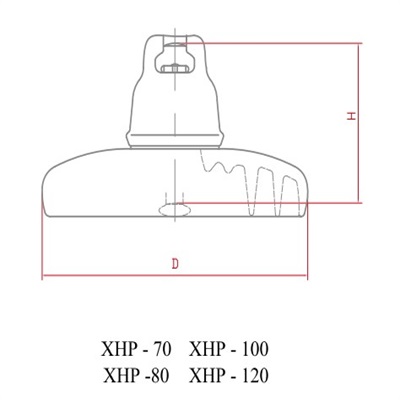
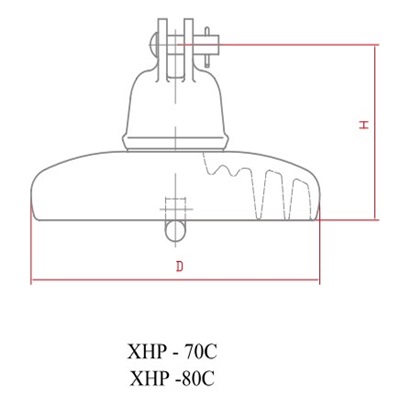
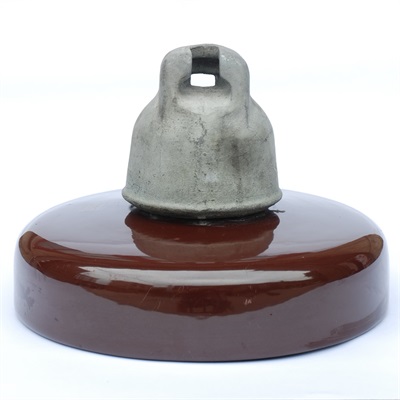
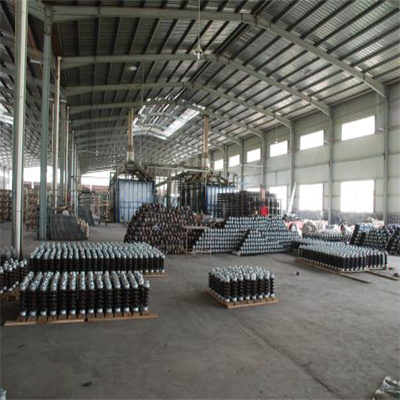
| MAIN DIMENSIONS AND STANDARD PARTICULARS | ||||||||
| Type | 52-1 | 52-2 | 52-3 | 52-4 | 52-5 | 52-6 | 52-9 | |
| Porcelain Disc Diameter,D.mm | 152 | 190 | 254 | 254 | 254 | 254 | 108 | |
| Unit Spacing,H.mm | 140 | 146 | 146 | 146 | 146 | 146 | 160 | |
| Creepage Distance,mm | 178 | 210 | 292 | 292 | 292 | 292 | 171 | |
| Combined M&E Strength,KN | 44 | 67 | 67 | 67 | 111 | 111 | 44 | |
| Impact Strength,N-m | 5 | 5.5 | 6 | 6 | 7 | 7 | 5 | |
| Routine Proof Test Load,KN | 22 | 33.5 | 33.5 | 33.5 | 55.5 | 55.5 | 22 | |
| Time Load Test Value | 27 | 44 | 44 | 44 | 67 | 67 | 27 | |
| Low Frequency Flashover Voltage | Dry, kv | 60 | 65 | 80 | 80 | 80 | 80 | 60 |
| Wet, kv | 30 | 35 | 50 | 50 | 50 | 50 | 30 | |
| Critical Impulse Flashover Voltage | Pos., kv | 100 | 115 | 125 | 125 | 125 | 125 | 100 |
| Neg., kv | 100 | 115 | 130 | 130 | 130 | 130 | 90 | |
| Low Frequency Puncture Voltage,KV | 80 | 90 | 110 | 110 | 110 | 110 | 80 | |
| Radio Influence Voltage Data | Test Voltage to Ground,KV | 7.5 | 7.5 | 10 | 10 | 10 | 10 | 7.5 |
| Max.RIV at 1000KHZ,UV | 50 | 50 | 50 | 50 | 50 | 50 | 50 | |
| Net Weight, Each Approx., kg | 2.5 | 3.5 | 4.6 | 4.6 | 5.5 | 5.5 | 2.5 | |
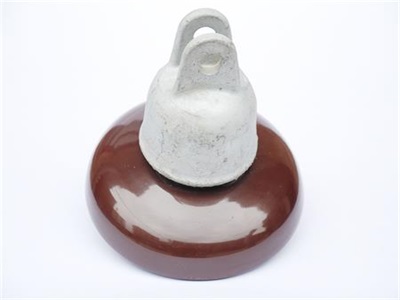
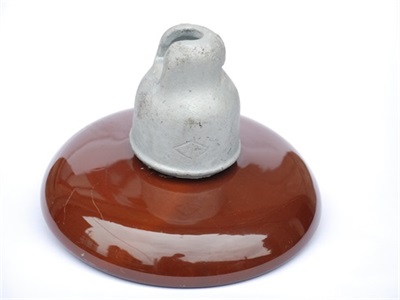
We warmly welcome friends both domestic and abroad to visit our company, if you have any questions, please contact with us directly.
Disc Insulator
Disc Insulator,Disc Type Insulator,Porcelain Disc Insulators,Suspension Disc Insulator
FUZHOU SINGREE IMP.& EXP.CO.,LTD. , https://www.cninsulators.com